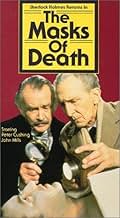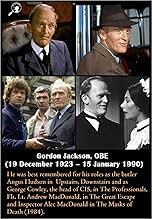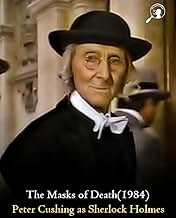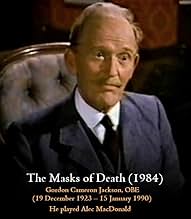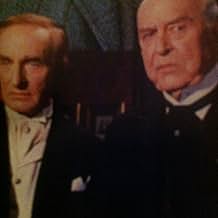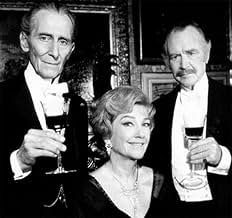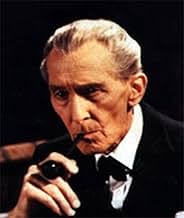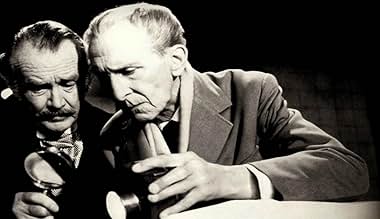Agrega una trama en tu idiomaSherlock Holmes investigates the case of a string of mysterious deaths with no apparent causes and the case of a missing German Prince that could cause war between England and Germany.Sherlock Holmes investigates the case of a string of mysterious deaths with no apparent causes and the case of a missing German Prince that could cause war between England and Germany.Sherlock Holmes investigates the case of a string of mysterious deaths with no apparent causes and the case of a missing German Prince that could cause war between England and Germany.
- Dirección
- Guionistas
- Elenco
- Dirección
- Guionistas
- Todo el elenco y el equipo
- Producción, taquilla y más en IMDbPro
Opiniones destacadas
Above all else, this TV movie was most welcome for giving Peter Cushing a chance to end his acting career on a high note and in one of his most celebrated roles (he appeared in one more film after this one but this was to be the last lead role of his long career). He'd first played Sherlock Holmes twenty-five years previously in a Hammer movie, and then in a 1968 BBC television series. Here, he revisits the character in a later stage of life and, accordingly, this time his rendition of the great detective is less agile and prone to moments of impatience and tetchiness. Cushing is just one of a number of senior actors in the cast, many of them sadly fast-approaching the end of their careers... Anne Baxter, Gordon Jackson, Anton Diffring... Ray Milland also sadly was not in great health at the time and it shows. Nevertheless, all give very good performances as one would expect from such distinguished names. The piece is nicely filmed with good location work and the music is okay too but unfortunately everything is let down by the plot. Much of the narrative involves Holmes and Watson investigating a supposed kidnapping which ultimately proves to be nothing more than a red-herring, conceived to keep Holmes distracted from another more important matter. One can't help wondering if it would have been easier for the villains to have simply assassinated Holmes if they were so worried about him bringing them to justice. And once this duplicity is discovered, the characters involved just vanish from the action and the story suddenly shifts to a climax that is, in itself rather unsatisfying. Why do Holmes and Watson, two ageing men, risk their lives in flushing the villains out of their lair when the police apparently have the whole place surrounded anyway?
It was a nice idea to see a more elderly Holmes in action for once and even better to have Peter Cushing playing him once again, and it's a shame that plans for a proposed follow-up never came to fruition, because a better story might have worked wonders. A good attempt that just doesnt quite come off.
It was a nice idea to see a more elderly Holmes in action for once and even better to have Peter Cushing playing him once again, and it's a shame that plans for a proposed follow-up never came to fruition, because a better story might have worked wonders. A good attempt that just doesnt quite come off.
If you're a fan of traditionally British suspense and cult cinema, it's pretty much impossible to dislike this modest, made-for-TV Sherlock Holmes oddity. In the mid-80s, long after the heyday of British studio-horror, veteran Roy Ward Baker directs his former Hammer regular Peter Cushing as he depicts Sir Arthur Conan Doyle's creation Sherlock Holmes for one last time. Cushing played Holmes in the fifties ("The Hound of the Baskervillers") and in a TV-series of the sixties, so for this occasion, the super-detective is allegedly retired, but still in close contact with his good buddy Dr. Watson and Scotland Yard inspector MacDonald. The latter begs Holmes to help with a curious case of three dead bodies that were discovered in the Thames. The corpses show no signs of physical violence, but the expression on their faces indicate that they died of pure fear. Before Holmes can properly start to investigate, his services are confiscated by the British Home Secretary and a dubious German ambassador named Von Felseck. They urge Sherlock Holmes to find a young German prince who went missing from Von Felseck's residence, as his disappearance might lead directly to a war between Germany and England. "The Masks of Death" certainly isn't the greatest Sherlock Holmes story ever penned down (it's not even based on an A.C. Doyle original, in fact) but it's tense and compelling enough to keep you guessing
along with Holmes and Watson. It's quite far-fetched and implausible, but there are a several inventive plot twists and scenes with plenty of action. Holmes' retirement age also turns out to be an ingenious gimmick, as he's occasionally less observant, sharp or subtle. Especially his thoughts on strong, opinionated women are chauvinist and old-fashioned.
The story is a little on the thin side, if decidedly chilling at the climax. But the pleasure of watching a first-rate assortment of mature actors go through their paces makes this a show worth watching again and again. Peter Cushing's Holmes is severe, ascetic and all business, John Mills' Watson cheerful and worth having in a tight spot, and Anne Baxter's Irene Adler a genuinely charming and intelligent lady.
This original Sherlock Holmes case (from a story by Anthony Hinds under his John Elder alias) also marks Peter Cushing's last starring role – he had first played the fastidious Baker Street detective in Hammer's 1959 version of THE HOUND OF THE BASKERVILLES, reprised in two TV series in 1964 and 1968 (during the course of which he eventually relinquished the part to Douglas Wilmer). His inseparable sidekick, Dr. John Watson, was interpreted by the likes of Andre' Morell, Nigel Stock and, here, Sir John Mills. Incidentally, given the actors' age, the film starts off with Holmes (typically and, in spite of Cushing's frail look, he is made to don a couple of disguises throughout) in retirement, his adventures being recounted to reporter Susan Penhaligon – whose appearance is relegated to this brief prologue, never subsequently picked up! Seeing the cast at work, one gets the feeling he is visiting a veterans' retirement home: supporting the leads, among others, are Ray Milland and Anne Baxter (both of whom would be dead within 2 years), Anton Diffring and Gordon Jackson! Anyway, the main narrative – set on the eve of WWI – seems to incorporate two unrelated mysteries (mildly thrilling but not really horrific, as I had been led to believe!) but which, unsurprisingly, are found to be connected: the first involves a number of corpses discovered bearing the titular countenance, the second the alleged kidnapping of the young heir to the German throne. The main setting, then, is Diffring's county manor – where Holmes runs into an old nemesis, Baxter, one of the very few who had ever managed to outwit him! – but the climax takes place in an underground lair, with our heroes incongruously resorting to shooting their way out of trouble! All in all, the film is an adequate (and pleasingly old-fashioned) time-passer, its biggest reward undoubtedly emerging Cushing's always delightful turn as Sir Arthur Conan Doyle's master sleuth. Even so, the sheer fact that so many of its participants – Cushing, Diffring, Milland, Penhaligon, Ward Baker and Elder – had previously excelled in the horror genre makes the surprising lack of it here seem doubly disappointing.
One of the main reasons for purchasing this movie on VHS was because Peter Cushing is in it, who makes a good Sherlock Holmes.
Sherlock Holmes comes out of retirement to investigate some strange murders in London's sewers. He teams up with Dr Watson once again. The the case takes them to Buckinghamshire. They end up back in London and down the sewers again, they discover a lab where poison gas is being made and these people are responsible for the murders and are arrested.
This movie is worth having just for the cast alone, many of them ageing: Peter Cushing (The Curse Of Frankenstein, Star Wars), Sir John Mills (Scott of the Antarctic, Tiger Bay), Ray Milland (The Man With X-Ray Eyes), Anton Diffring (Circus of Horrors, The Beast Must Die), Gordon Jackson (The Great Escape, The Ipcress File), Anne Baxter (I Confess) and Susan Penhaligon (The Land That Time Forgot). All play good parts. Of these people, only Sir John Mills and Susan Penhaligon are still alive today.
I enjoyed this movie ans is worth looking at.
Rating: 3 stars out of 5.
Sherlock Holmes comes out of retirement to investigate some strange murders in London's sewers. He teams up with Dr Watson once again. The the case takes them to Buckinghamshire. They end up back in London and down the sewers again, they discover a lab where poison gas is being made and these people are responsible for the murders and are arrested.
This movie is worth having just for the cast alone, many of them ageing: Peter Cushing (The Curse Of Frankenstein, Star Wars), Sir John Mills (Scott of the Antarctic, Tiger Bay), Ray Milland (The Man With X-Ray Eyes), Anton Diffring (Circus of Horrors, The Beast Must Die), Gordon Jackson (The Great Escape, The Ipcress File), Anne Baxter (I Confess) and Susan Penhaligon (The Land That Time Forgot). All play good parts. Of these people, only Sir John Mills and Susan Penhaligon are still alive today.
I enjoyed this movie ans is worth looking at.
Rating: 3 stars out of 5.
¿Sabías que…?
- TriviaThis was Peter Cushing's final television appearance before his death on August 11, 1994 at the age of 81.
- Citas
Dr. John H. Watson: No sane man wants war.
Sherlock Holmes: That is the trouble, Watson. There are otherwise sane men who do want war.
- ConexionesReferenced in The Nostalgia Critic: The Great Mouse Detective (2023)
Selecciones populares
Inicia sesión para calificar y agrega a la lista de videos para obtener recomendaciones personalizadas
Detalles
- Fecha de lanzamiento
- País de origen
- Idioma
- También se conoce como
- Sherlock Holmes and the Masks of Death
- Locaciones de filmación
- Productora
- Ver más créditos de la compañía en IMDbPro
- Tiempo de ejecución1 hora 18 minutos
- Mezcla de sonido
Contribuir a esta página
Sugiere una edición o agrega el contenido que falta

Principales brechas de datos
By what name was The Masks of Death (1984) officially released in India in English?
Responda
